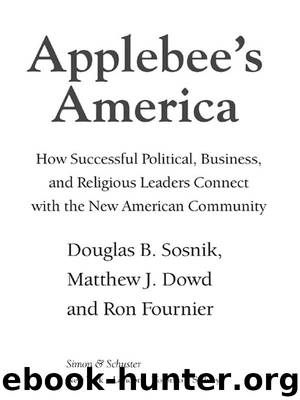Applebee's America by Douglas B. Sosnik Matthew J. Dowd & Ron Fournier

Author:Douglas B. Sosnik, Matthew J. Dowd & Ron Fournier
Language: eng
Format: epub
Publisher: Simon & Schuster
Published: 2006-07-15T00:00:00+00:00
Pre-9/11: The Onset of Change
Lori Nowak noticed the change in the mid-1990s. “The economy turned around and things were going gangbusters, but something wasn’t right. I felt empty inside,” said the thirty-four-year-old Woonsocket, Rhode Island, homemaker between bites of lunch at her local Applebee’s. “I needed something more out of life.”
It hit Charlie Roy about the same time. “With the world going nuts, I realized the only thing I can rely on is myself, my family, and my friends,” said the fifty-four-year-old Cumberland, Rhode Island, teacher. “All the other priorities I had as a younger man were no longer a priority.”
Julian Sowa started looking at life differently after the dot-com bubble burst in March 2000. Tech stocks plunged, wiping out trillions of dollars of wealth on paper and helping to push the country into the 2001 recession. “I lost a big piece of me in the market,” said the systems operator from suburban Chicago. Eating dinner one night at an Applebee’s a few miles from the Willow Creek megachurch, Sowa said he had to strip life down to its basics after the go-go ’90s. “I had my wife, my home, and a good life. I decided to focus on the precious things.”
Weary of change and skeptical of the status quo, Americans entered the twenty-first century unsure where to turn for answers. So they turned to one another. With the help of new technologies, people seized more control over their way of life—checking in at the office while pushing the kids on a park swing or e-mailing Mom in Florida every day. They felt empowered and obliged to help others. More Americans agreed that “people have a definite responsibility to help people in their community who are less fortunate than they are” (55 percent, up 6 points from 1995 to 2001), according to a Roper analysis.
“Rather than look to forces beyond themselves—their congressman or senator, the White House, the nation’s major corporations—Americans have increasingly looked to themselves for answers,” wrote Ed Keller and Jon Berry in their groundbreaking The Influentials, based on their access to three decades of Roper surveys. “They are saying, in effect, ‘I’m a resourceful person. I can figure out a lot on my own. And I can connect to others to help me solve the problems I cannot resolve with my own resources, to create the life I want.’ ”
Their firm first documented the mood shift in 1993, nearly a decade before 9/11. In a special report to clients, the survey firm stated that Americans were “sobering up” financially and becoming more realistic. “Americans are taking greater responsibility for their actions.” Even as the economy recovered and wealth abounded, the trend toward self-reliance and control continued, and Roper’s analysts gave it a name—the “Age of Autonomy.” In the business world, this meant the rise of smart shoppers who rejected brands that carried a premium price and used new tools, particularly the Internet, to find brands that offered quality and a good price.
Voters started shopping around, too, according
Download
This site does not store any files on its server. We only index and link to content provided by other sites. Please contact the content providers to delete copyright contents if any and email us, we'll remove relevant links or contents immediately.
| African-American Studies | Asian American Studies |
| Disabled | Ethnic Studies |
| Hispanic American Studies | LGBT |
| Minority Studies | Native American Studies |
Cecilia; Or, Memoirs of an Heiress — Volume 1 by Fanny Burney(31332)
Cecilia; Or, Memoirs of an Heiress — Volume 3 by Fanny Burney(30934)
Cecilia; Or, Memoirs of an Heiress — Volume 2 by Fanny Burney(30889)
The Great Music City by Andrea Baker(21311)
We're Going to Need More Wine by Gabrielle Union(18072)
Bombshells: Glamour Girls of a Lifetime by Sullivan Steve(13108)
Pimp by Iceberg Slim(12931)
All the Missing Girls by Megan Miranda(12747)
Fifty Shades Freed by E L James(12451)
Norse Mythology by Gaiman Neil(11883)
Talking to Strangers by Malcolm Gladwell(11876)
Crazy Rich Asians by Kevin Kwan(8349)
Mindhunter: Inside the FBI's Elite Serial Crime Unit by John E. Douglas & Mark Olshaker(7834)
The Lost Art of Listening by Michael P. Nichols(6472)
Enlightenment Now: The Case for Reason, Science, Humanism, and Progress by Steven Pinker(6405)
Bad Blood by John Carreyrou(5768)
The Four Agreements by Don Miguel Ruiz(5510)
Weapons of Math Destruction by Cathy O'Neil(5036)
We Need to Talk by Celeste Headlee(4868)
